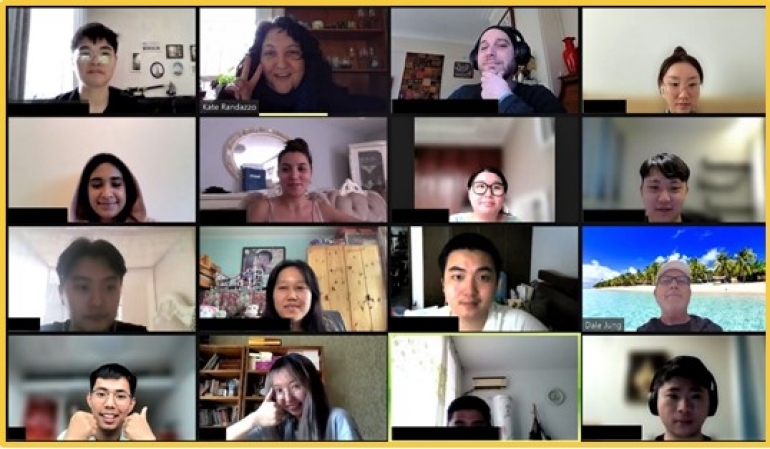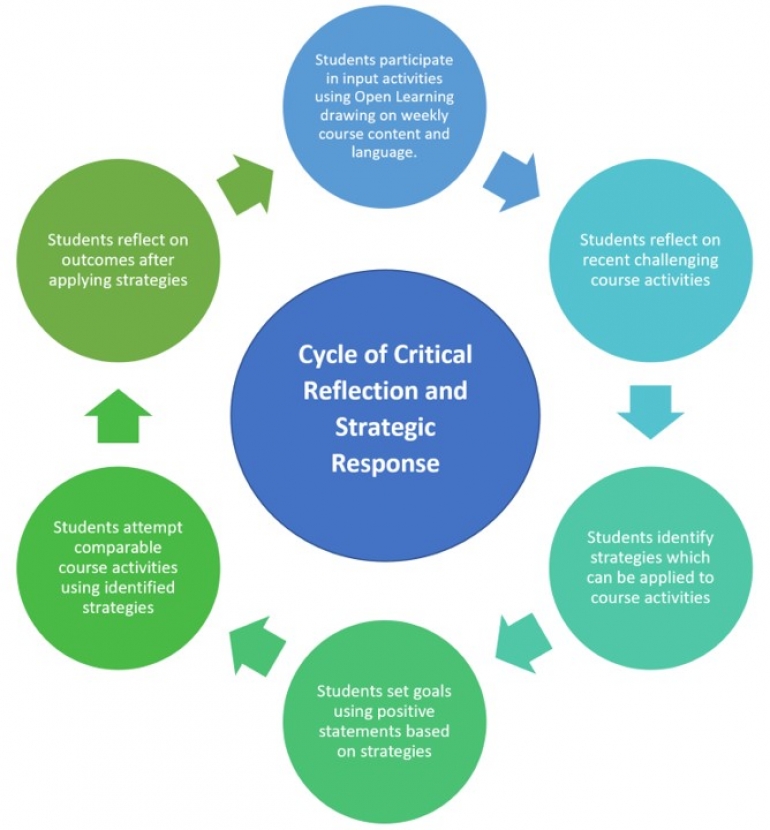By Dale Jung and Kate Randazzo
At UNSW Global, the team are dedicated to helping students achieve success in their studies and career as they pave the pathway to ongoing studies at UNSW.
Last week, at the English Australia Conference 2021, Dale and Kate’s 'Upward Cycle' project won the ‘English Australia Award for Action Research.’ UNSW Global was also awarded with the ‘Anne Burns Action Research Grant’ for their ongoing commitment to Action research in the ELICOS sector.
With all courses now delivered online, a current challenge facing the online delivery of academic pathway courses is to ensure and measure progress. This is crucial in the context of short pathway courses for young learners who may lack the engagement, motivation, self-awareness, and agency to achieve their pathway outcomes.
To address this, we aimed to transform student attitudes, moving beyond simple grade achievement to a focus on engagement with learning processes and self-awareness. This was implemented through a personalised and reflective approach to course content and outcomes, with an intent to build a learning community of shared goals and intersecting experiences to create a strong sense of learner agency and accountability.
The Project
UNSW Global observed two successive English Language Intensive Courses for Overseas Students (ELICOS) cohorts in the ten-week Foundation English Entry Course (FEEC). Cohort 1 consisted of 16 students from China, while Cohort 2 comprised of 11 students from China and one from Turkey. Their ages ranged between 17 and 21 years. The course was housed online using the OpenLearning platform, with interactive lesson materials and activities, complemented with live classes taught via Zoom.
The project aimed to address two questions:
- What impact do the cycles of blogging and critical self-reflection and strategic response have on student engagement?
- What is the impact of these cycles on student progress against established course outcomes?
Central to the project was to assess the student’s engagement with their own progress. Here is where the ‘Upward Cycle’ is introduced, involving two weekly cycles delivered via the OpenLearning platform.
The first cycle was Blogging with 10 guided entries. Students blogged about themselves and their lives, reinforcing language learnings from the course. They shared posts, pictures, videos, and voice recordings and interacted with each other by commenting.
“The OpenLearning program posts events about each week's units, and I do them regularly. At the same time, I can communicate with my teachers and friends. We are also improving our writing skills by blogging. It has been a good activity for me to write a blog and give information with photos. I gave information about my own cultural characteristics and read my friends' blogs. I think this feature is very useful for meeting and learning new information,” said one student from Cohort 2.
The second cycle was Critical Reflection and Strategic Response with 10 series of guided tasks. Students critically reflected on their performance and experience of assessments. They used this reflection to identify areas for improvement, applied appropriate strategies and set learning goals.
“I set personal learning goals: because if there is no goal, there is no motivation to learn. It is the belief that supports me to study hard,” stated another student form Cohort 1.
Findings
We have seen an increase in student engagement in terms of the average number of online student comments on course activities over 10 weeks. These rose from an average of 139 comments for the previous equivalent cohort to 268 in cycle 1 and 409 and cycle 2.
The average percentage of course competition had risen from 87.27% to 94.41% in cycle 1 (including eight students with 100%) to 98.23% in cycle 2 (including six students with 100%). In both research cycles, half of each class achieved 100% completion, demonstrating an unprecedented level of course engagement.
The significance of course engagement is further highlighted by students in their responses in the final essay and course reflection activities. On Blogging and Critical Reflection and Strategic Response, students consistently placed value on:
- building relationships
- improving language and communication skills
- expressing themselves
- promoting learning
- recording personal growth and progress
“During the course, I completed Reflection Activities. What I learnt from this is that it's more effective to stop and think than just keep going,” a student from Cohort 1 observed.
“Having these skills can help my future in all aspects, such as learning, independent life, teamwork and social activities,” remarked another student from Cohort 2.
Outcomes
The average course results were demonstrably higher than previous cohorts. Most students achieved well above the minimum requirement to an extent that has not previously occurred. The percentage of students from both cycle 1 and 2 who achieved the results required for entry into Foundation Studies was very high, at 100%, compared with previous cohorts, ranging between 86% and 95%.
FEEC students continue into year-long Foundation courses before entering UNSW undergraduate degrees. It is evident that with the addition of the ‘Upward Cycle’ to current course content, it has equipped students to be better prepared and ready to pursue ongoing studies at UNSW.
For more information about UNSW Global, visit their website.
***
Dale Jung has been an English Language Teacher at UNSW Global for over 20 years, having taught on a range of Academic and General English courses and, in recent years, on UNSW Global’s online Foundation English entry program. He is particularly interested in developing course materials for younger Academic English pathway students which promote greater interaction, collaboration and engagement using group-based projects and assessments.
Kate Randazzo is an education professional at UNSW Global, where she has taught across a range of academic English programs, and has been involved in curriculum development and assessment design. She has a Master of Education (TESOL) and has completed a Professional Certificate of Language Assessment. She is particularly interested in improving learner engagement and motivation, and the student experience. She is currently participating in the English Australia Action Research in ELICOS Program for this reason.

